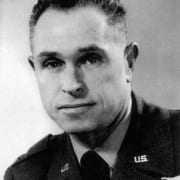Colonel Aaron Bank – The Founder of the Green Berets
By Marc Liebman
As a young man, Aaron Bank, who was born in 1902, traveled extensively through Europe and became fluent in German and French. At the outbreak of World War II, he was 37 and volunteered to serve. Initially, the military rejected him due to his age, but Bank persevered. He went through Officer Candidate School and was commissioned as a second lieutenant. Because of his language proficiency, Bank was assigned to the Office of Strategic Services (OSS).
After training in the U.S. and U.K. on how to conduct clandestine operations, he parachuted into the Vosges region of France on July 31, 1944 as the leader of the three-man Jedburgh team, code named Packard. Each team consisted of an officer, a demolitions expert, and a radio-operator. Bank, as well as his other team members, knew if they were captured, the Gestapo would torture and kill them. His team, aided by French partisans, harassed the Germans until he was pulled out in late 1944.
Bank’s next assignment came directly from the head of the OSS, General William Donovan, who told one of his subordinates, “Tell Bank to get Hitler.” For this mission, Bank recruited a team of anti-Nazis and former German soldiers who would parachute into Germany and kill Adolph Hitler if/when he fled to his redoubt in Berchtesgaden. The OSS scrubbed the mission just after the team boarded an airplane to fly into Bavaria in late April 1945.
With the war over in Germany, Bank went to French Indochina to lead teams rescuing French and other Europeans held prisoner by the Japanese. While there, Bank worked with Ho Chi Minh, who was fighting the Vietnamese. Impressed with Minh and his popularity, he suggested to the OSS and the State Department that Minh was extremely popular and would win a free election.
Bank recommended Minh be allowed to form a government after the war. He encouraged the Vietnamese leader to contact the State Department for support for a Vietnam free from the French as part of Roosevelt’s vision of a post-war world in which the British and French colonies would be given their independence. Minh tried several times in the late 1940s and early fifties, but each time his appeal was either ignored or rejected because the Truman and later Eisenhower administrations viewed Ho Chi Minh as a dedicated Communist. By then, the Cold War was underway.
After the war, Bank remained in the Army and served in intelligence billets in Europe before being sent to Korea as the executive officer of the 187th Regimental Combat Team.
Back in the U.S., Bank became the Chief of the Special Operations Branch of the Army’s Office of Psychological Warfare. His task was to “staff and gain approval for an OSS Jedburgh style team.” In 1952, the Army approved and funded a 2,500-man unit. Its mission was “to infiltrate by land, sea or air deep into enemy occupied territory and organize the resistance guerrilla potential to conduct Special Forces operations with the emphasis on guerrilla training.”
Bank and seven others started the 10th Special Forces Group (Airborne) on June 19, 1952 in Fort Bragg, North Carolina. Within two years, the 10th was manned and operational. After the Berlin Uprising in 1953, the 10th was split into two units, the 10th and the 77th, and both were expanded in size. The structure, training, tactics, and employment of Green Beret A teams that Bank outlined in 1952 are still used today. Colonel Bank retired in 1958.
After Bank left the Army, President Kennedy authorized the wearing of the “beret, man’s, wool, rifle green, Army shade 297.” Since then, the Army Special Forces have been known as the Green Berets.
This quiet warrior didn’t stop serving his country after he left the army. Horrified at the lack of security at the San Onofre nuclear plant in Southern California near where he lived, Bank lobbied for change. Twice he had to publicly expose the vulnerability of the plant to sabotage. Finally, in 1974, the Nuclear Regulatory Commission acted on his recommendations for all nuclear power plants in the U.S.
Aaron Bank wrote two books. One, “From OSS to Green Berets: The Birth of Special Forces,” describes his life and career. The other, co-written by Erwin Nathanson, is a novel titled “Operation Iron Cross,” which is a fictionalized account of the mission to kill Hitler. The book became the basis for the movie “The Dirty Dozen.”
Bank died in 2004 at the age of 101.
Volume 74. Number 4 . 2020




